Climate Change Influence on Tourism Accommodation & Attraction
VerifiedAdded on 2022/09/06
|5
|1330
|37
Essay
AI Summary
This essay examines the significant impact of climate change on the tourism industry, particularly focusing on the accommodation and attraction sectors. It highlights how climate change influences tourist behavior, destination selection, and overall satisfaction, thereby affecting the sustainability of tourism. The essay discusses the need for researchers and organizations to analyze these impacts and develop strategies to mitigate the negative effects of climate change, such as rising temperatures, sea levels, and air pollution. It references studies and guides from various regions, including Australia and Switzerland, to illustrate the challenges and potential solutions, like energy conservation, and the shift in tourist preferences towards less climate-sensitive destinations. The essay underscores the importance of adapting to these changes to ensure the long-term viability of the tourism sector and maintain its appeal to tourists concerned about climate change impacts.
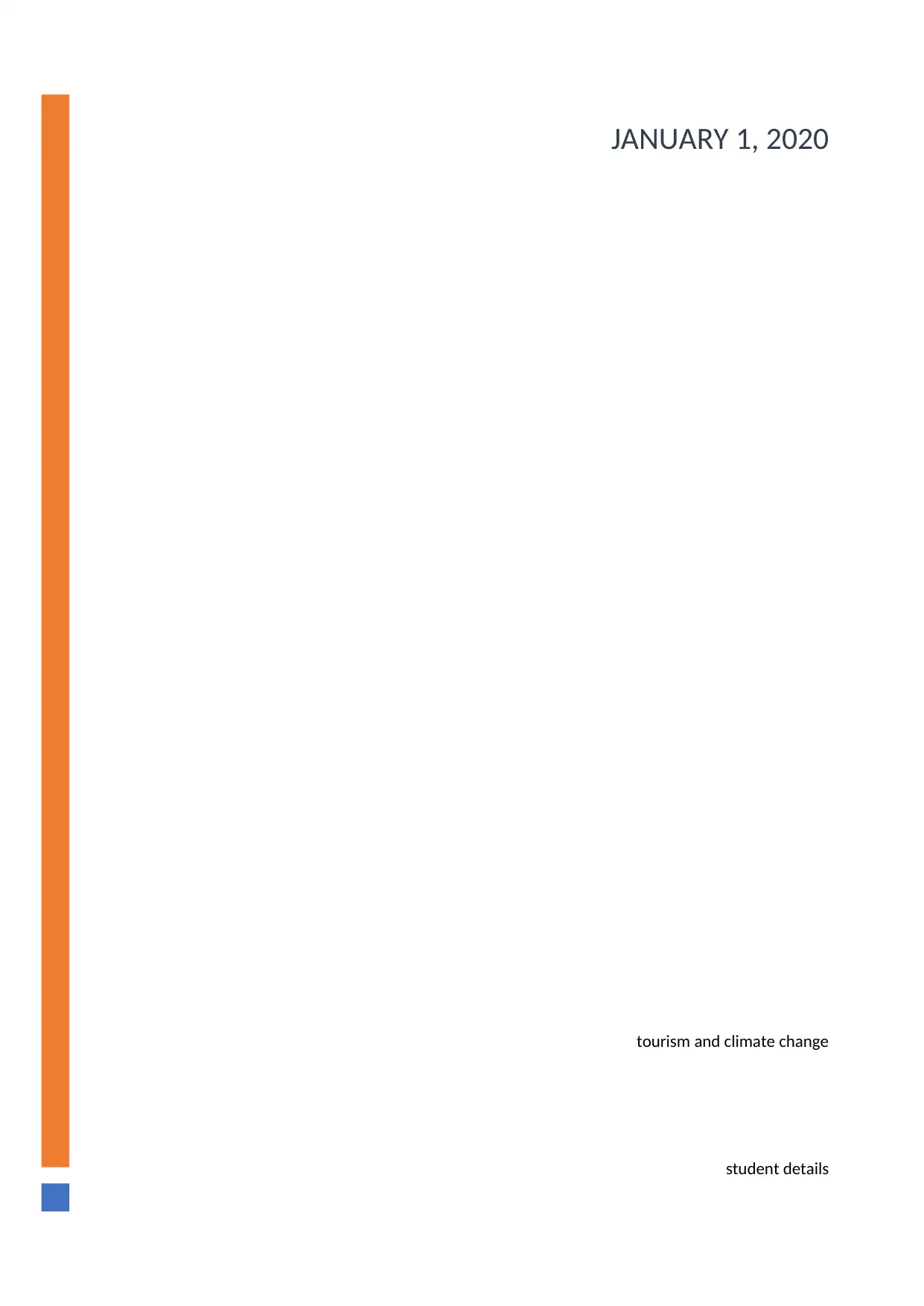
tourism and climate change
student details
JANUARY 1, 2020
student details
JANUARY 1, 2020
Paraphrase This Document
Need a fresh take? Get an instant paraphrase of this document with our AI Paraphraser
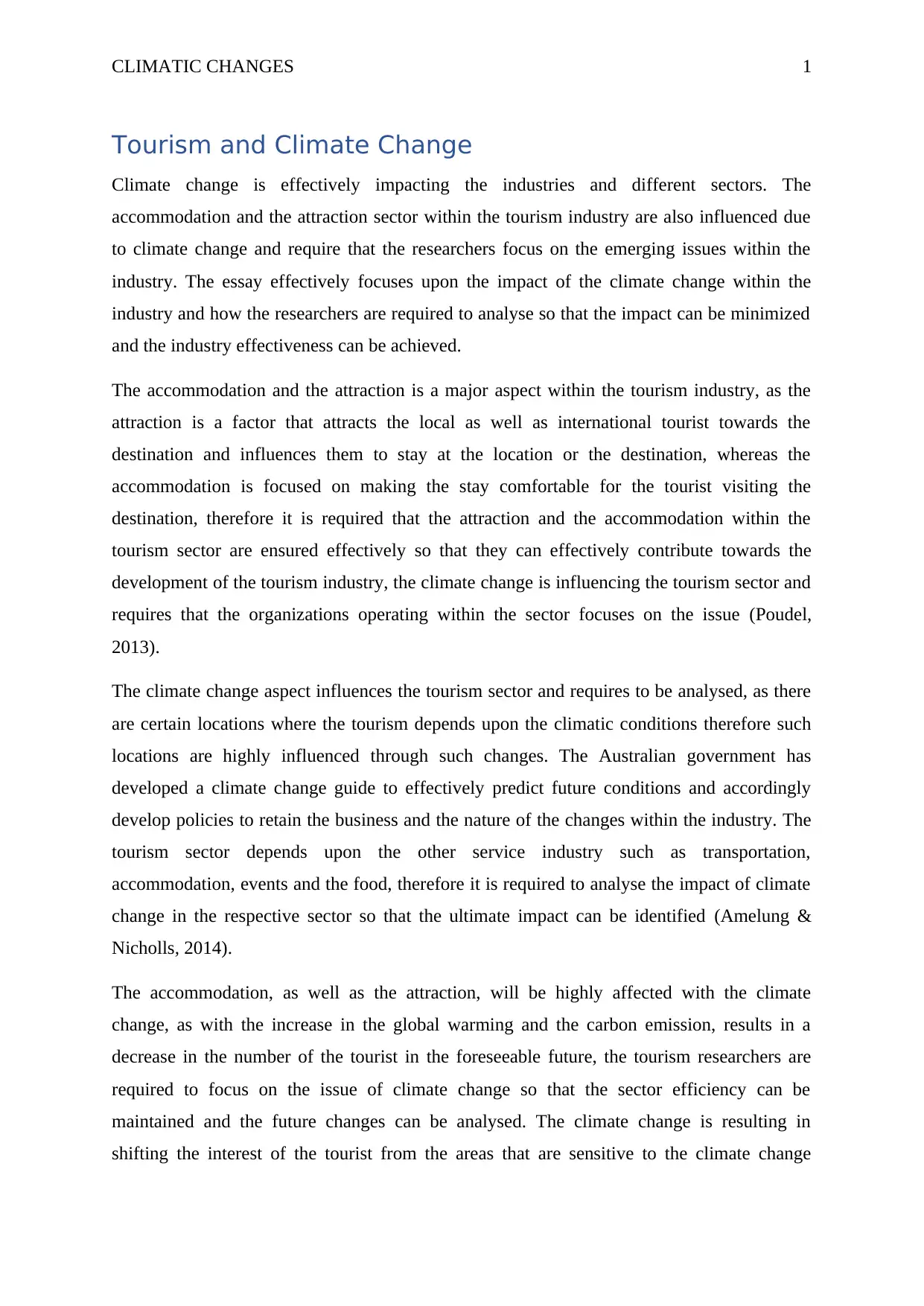
CLIMATIC CHANGES 1
Tourism and Climate Change
Climate change is effectively impacting the industries and different sectors. The
accommodation and the attraction sector within the tourism industry are also influenced due
to climate change and require that the researchers focus on the emerging issues within the
industry. The essay effectively focuses upon the impact of the climate change within the
industry and how the researchers are required to analyse so that the impact can be minimized
and the industry effectiveness can be achieved.
The accommodation and the attraction is a major aspect within the tourism industry, as the
attraction is a factor that attracts the local as well as international tourist towards the
destination and influences them to stay at the location or the destination, whereas the
accommodation is focused on making the stay comfortable for the tourist visiting the
destination, therefore it is required that the attraction and the accommodation within the
tourism sector are ensured effectively so that they can effectively contribute towards the
development of the tourism industry, the climate change is influencing the tourism sector and
requires that the organizations operating within the sector focuses on the issue (Poudel,
2013).
The climate change aspect influences the tourism sector and requires to be analysed, as there
are certain locations where the tourism depends upon the climatic conditions therefore such
locations are highly influenced through such changes. The Australian government has
developed a climate change guide to effectively predict future conditions and accordingly
develop policies to retain the business and the nature of the changes within the industry. The
tourism sector depends upon the other service industry such as transportation,
accommodation, events and the food, therefore it is required to analyse the impact of climate
change in the respective sector so that the ultimate impact can be identified (Amelung &
Nicholls, 2014).
The accommodation, as well as the attraction, will be highly affected with the climate
change, as with the increase in the global warming and the carbon emission, results in a
decrease in the number of the tourist in the foreseeable future, the tourism researchers are
required to focus on the issue of climate change so that the sector efficiency can be
maintained and the future changes can be analysed. The climate change is resulting in
shifting the interest of the tourist from the areas that are sensitive to the climate change
Tourism and Climate Change
Climate change is effectively impacting the industries and different sectors. The
accommodation and the attraction sector within the tourism industry are also influenced due
to climate change and require that the researchers focus on the emerging issues within the
industry. The essay effectively focuses upon the impact of the climate change within the
industry and how the researchers are required to analyse so that the impact can be minimized
and the industry effectiveness can be achieved.
The accommodation and the attraction is a major aspect within the tourism industry, as the
attraction is a factor that attracts the local as well as international tourist towards the
destination and influences them to stay at the location or the destination, whereas the
accommodation is focused on making the stay comfortable for the tourist visiting the
destination, therefore it is required that the attraction and the accommodation within the
tourism sector are ensured effectively so that they can effectively contribute towards the
development of the tourism industry, the climate change is influencing the tourism sector and
requires that the organizations operating within the sector focuses on the issue (Poudel,
2013).
The climate change aspect influences the tourism sector and requires to be analysed, as there
are certain locations where the tourism depends upon the climatic conditions therefore such
locations are highly influenced through such changes. The Australian government has
developed a climate change guide to effectively predict future conditions and accordingly
develop policies to retain the business and the nature of the changes within the industry. The
tourism sector depends upon the other service industry such as transportation,
accommodation, events and the food, therefore it is required to analyse the impact of climate
change in the respective sector so that the ultimate impact can be identified (Amelung &
Nicholls, 2014).
The accommodation, as well as the attraction, will be highly affected with the climate
change, as with the increase in the global warming and the carbon emission, results in a
decrease in the number of the tourist in the foreseeable future, the tourism researchers are
required to focus on the issue of climate change so that the sector efficiency can be
maintained and the future changes can be analysed. The climate change is resulting in
shifting the interest of the tourist from the areas that are sensitive to the climate change
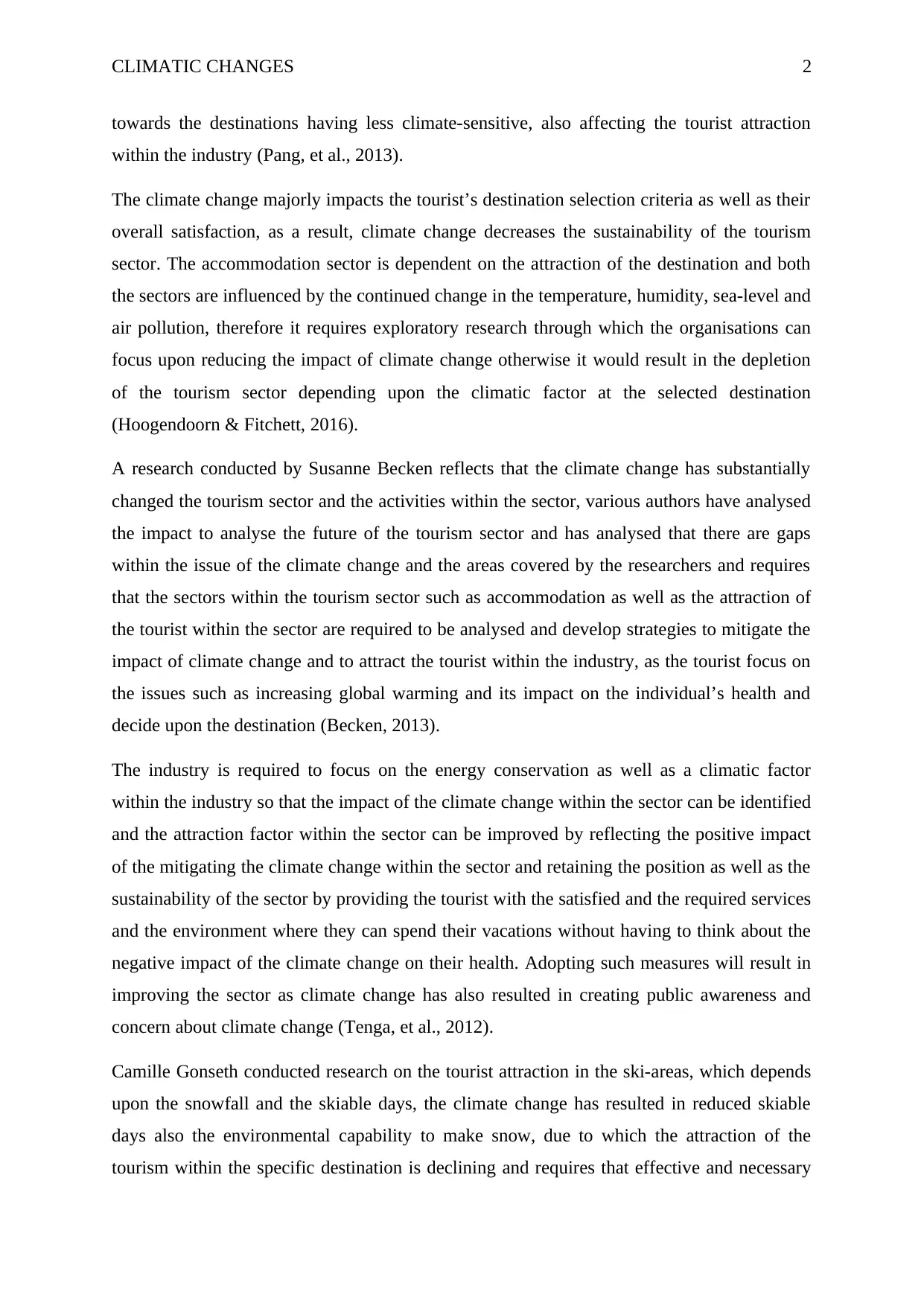
CLIMATIC CHANGES 2
towards the destinations having less climate-sensitive, also affecting the tourist attraction
within the industry (Pang, et al., 2013).
The climate change majorly impacts the tourist’s destination selection criteria as well as their
overall satisfaction, as a result, climate change decreases the sustainability of the tourism
sector. The accommodation sector is dependent on the attraction of the destination and both
the sectors are influenced by the continued change in the temperature, humidity, sea-level and
air pollution, therefore it requires exploratory research through which the organisations can
focus upon reducing the impact of climate change otherwise it would result in the depletion
of the tourism sector depending upon the climatic factor at the selected destination
(Hoogendoorn & Fitchett, 2016).
A research conducted by Susanne Becken reflects that the climate change has substantially
changed the tourism sector and the activities within the sector, various authors have analysed
the impact to analyse the future of the tourism sector and has analysed that there are gaps
within the issue of the climate change and the areas covered by the researchers and requires
that the sectors within the tourism sector such as accommodation as well as the attraction of
the tourist within the sector are required to be analysed and develop strategies to mitigate the
impact of climate change and to attract the tourist within the industry, as the tourist focus on
the issues such as increasing global warming and its impact on the individual’s health and
decide upon the destination (Becken, 2013).
The industry is required to focus on the energy conservation as well as a climatic factor
within the industry so that the impact of the climate change within the sector can be identified
and the attraction factor within the sector can be improved by reflecting the positive impact
of the mitigating the climate change within the sector and retaining the position as well as the
sustainability of the sector by providing the tourist with the satisfied and the required services
and the environment where they can spend their vacations without having to think about the
negative impact of the climate change on their health. Adopting such measures will result in
improving the sector as climate change has also resulted in creating public awareness and
concern about climate change (Tenga, et al., 2012).
Camille Gonseth conducted research on the tourist attraction in the ski-areas, which depends
upon the snowfall and the skiable days, the climate change has resulted in reduced skiable
days also the environmental capability to make snow, due to which the attraction of the
tourism within the specific destination is declining and requires that effective and necessary
towards the destinations having less climate-sensitive, also affecting the tourist attraction
within the industry (Pang, et al., 2013).
The climate change majorly impacts the tourist’s destination selection criteria as well as their
overall satisfaction, as a result, climate change decreases the sustainability of the tourism
sector. The accommodation sector is dependent on the attraction of the destination and both
the sectors are influenced by the continued change in the temperature, humidity, sea-level and
air pollution, therefore it requires exploratory research through which the organisations can
focus upon reducing the impact of climate change otherwise it would result in the depletion
of the tourism sector depending upon the climatic factor at the selected destination
(Hoogendoorn & Fitchett, 2016).
A research conducted by Susanne Becken reflects that the climate change has substantially
changed the tourism sector and the activities within the sector, various authors have analysed
the impact to analyse the future of the tourism sector and has analysed that there are gaps
within the issue of the climate change and the areas covered by the researchers and requires
that the sectors within the tourism sector such as accommodation as well as the attraction of
the tourist within the sector are required to be analysed and develop strategies to mitigate the
impact of climate change and to attract the tourist within the industry, as the tourist focus on
the issues such as increasing global warming and its impact on the individual’s health and
decide upon the destination (Becken, 2013).
The industry is required to focus on the energy conservation as well as a climatic factor
within the industry so that the impact of the climate change within the sector can be identified
and the attraction factor within the sector can be improved by reflecting the positive impact
of the mitigating the climate change within the sector and retaining the position as well as the
sustainability of the sector by providing the tourist with the satisfied and the required services
and the environment where they can spend their vacations without having to think about the
negative impact of the climate change on their health. Adopting such measures will result in
improving the sector as climate change has also resulted in creating public awareness and
concern about climate change (Tenga, et al., 2012).
Camille Gonseth conducted research on the tourist attraction in the ski-areas, which depends
upon the snowfall and the skiable days, the climate change has resulted in reduced skiable
days also the environmental capability to make snow, due to which the attraction of the
tourism within the specific destination is declining and requires that effective and necessary
⊘ This is a preview!⊘
Do you want full access?
Subscribe today to unlock all pages.

Trusted by 1+ million students worldwide
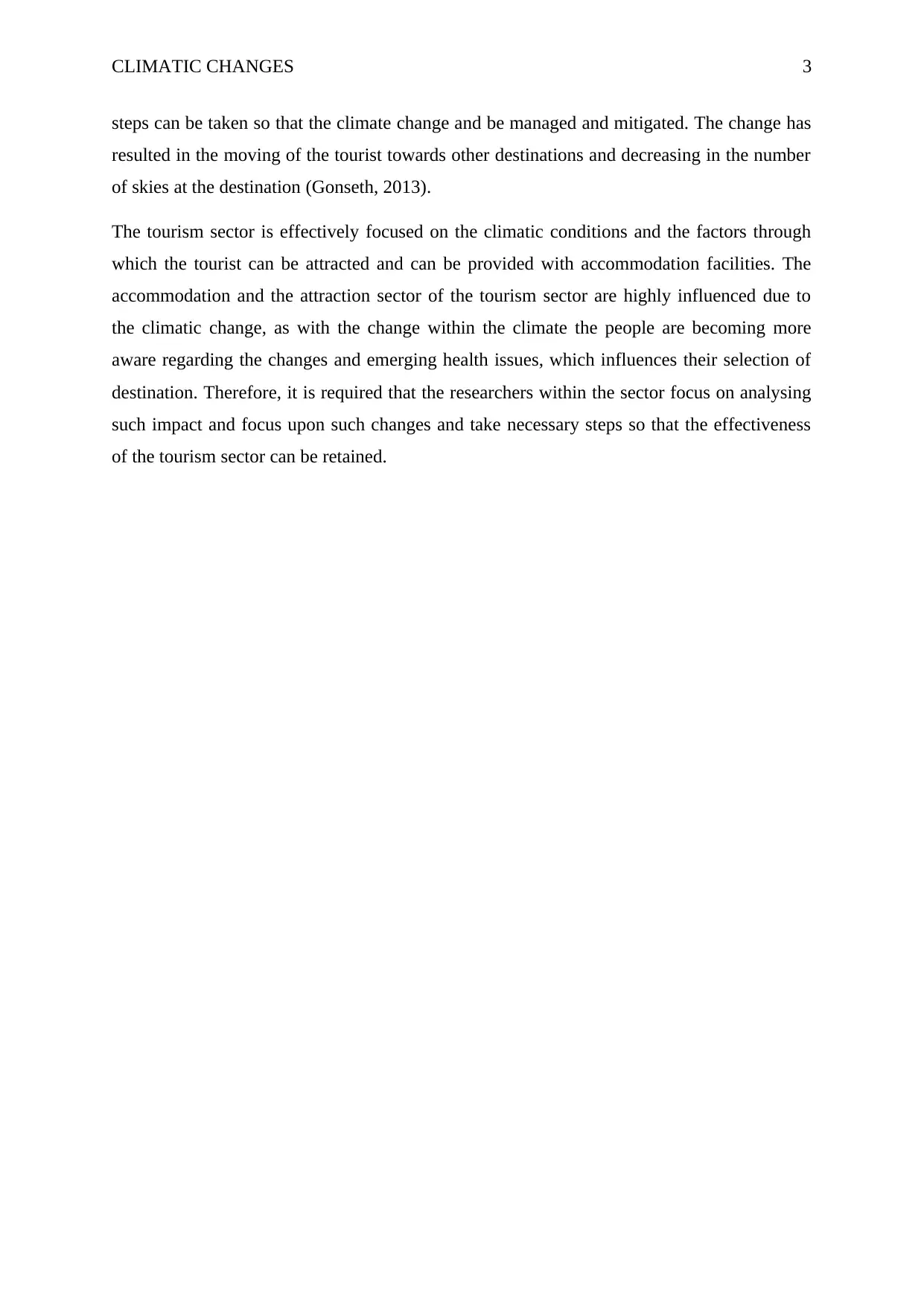
CLIMATIC CHANGES 3
steps can be taken so that the climate change and be managed and mitigated. The change has
resulted in the moving of the tourist towards other destinations and decreasing in the number
of skies at the destination (Gonseth, 2013).
The tourism sector is effectively focused on the climatic conditions and the factors through
which the tourist can be attracted and can be provided with accommodation facilities. The
accommodation and the attraction sector of the tourism sector are highly influenced due to
the climatic change, as with the change within the climate the people are becoming more
aware regarding the changes and emerging health issues, which influences their selection of
destination. Therefore, it is required that the researchers within the sector focus on analysing
such impact and focus upon such changes and take necessary steps so that the effectiveness
of the tourism sector can be retained.
steps can be taken so that the climate change and be managed and mitigated. The change has
resulted in the moving of the tourist towards other destinations and decreasing in the number
of skies at the destination (Gonseth, 2013).
The tourism sector is effectively focused on the climatic conditions and the factors through
which the tourist can be attracted and can be provided with accommodation facilities. The
accommodation and the attraction sector of the tourism sector are highly influenced due to
the climatic change, as with the change within the climate the people are becoming more
aware regarding the changes and emerging health issues, which influences their selection of
destination. Therefore, it is required that the researchers within the sector focus on analysing
such impact and focus upon such changes and take necessary steps so that the effectiveness
of the tourism sector can be retained.
Paraphrase This Document
Need a fresh take? Get an instant paraphrase of this document with our AI Paraphraser
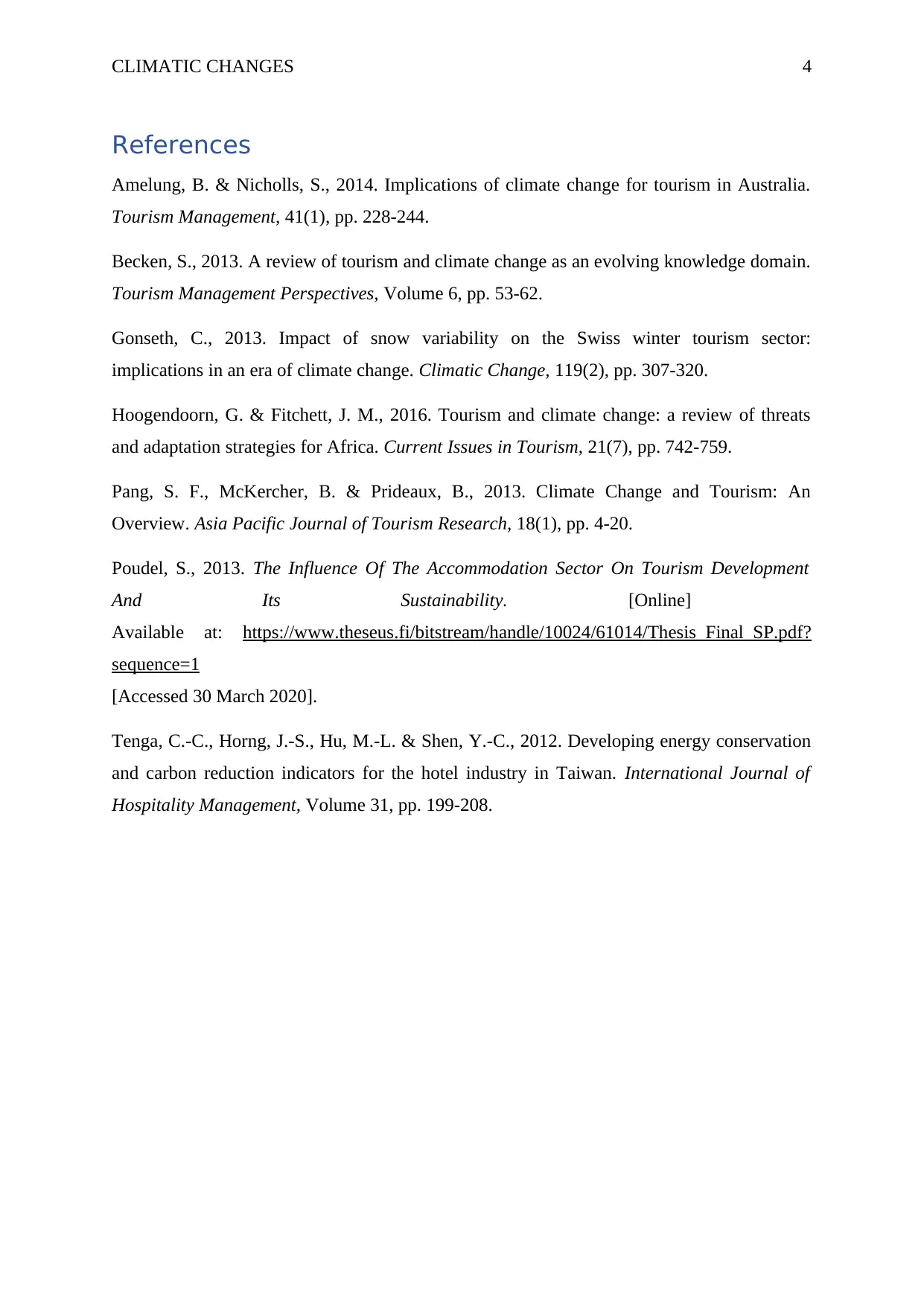
CLIMATIC CHANGES 4
References
Amelung, B. & Nicholls, S., 2014. Implications of climate change for tourism in Australia.
Tourism Management, 41(1), pp. 228-244.
Becken, S., 2013. A review of tourism and climate change as an evolving knowledge domain.
Tourism Management Perspectives, Volume 6, pp. 53-62.
Gonseth, C., 2013. Impact of snow variability on the Swiss winter tourism sector:
implications in an era of climate change. Climatic Change, 119(2), pp. 307-320.
Hoogendoorn, G. & Fitchett, J. M., 2016. Tourism and climate change: a review of threats
and adaptation strategies for Africa. Current Issues in Tourism, 21(7), pp. 742-759.
Pang, S. F., McKercher, B. & Prideaux, B., 2013. Climate Change and Tourism: An
Overview. Asia Pacific Journal of Tourism Research, 18(1), pp. 4-20.
Poudel, S., 2013. The Influence Of The Accommodation Sector On Tourism Development
And Its Sustainability. [Online]
Available at: https://www.theseus.fi/bitstream/handle/10024/61014/Thesis_Final_SP.pdf?
sequence=1
[Accessed 30 March 2020].
Tenga, C.-C., Horng, J.-S., Hu, M.-L. & Shen, Y.-C., 2012. Developing energy conservation
and carbon reduction indicators for the hotel industry in Taiwan. International Journal of
Hospitality Management, Volume 31, pp. 199-208.
References
Amelung, B. & Nicholls, S., 2014. Implications of climate change for tourism in Australia.
Tourism Management, 41(1), pp. 228-244.
Becken, S., 2013. A review of tourism and climate change as an evolving knowledge domain.
Tourism Management Perspectives, Volume 6, pp. 53-62.
Gonseth, C., 2013. Impact of snow variability on the Swiss winter tourism sector:
implications in an era of climate change. Climatic Change, 119(2), pp. 307-320.
Hoogendoorn, G. & Fitchett, J. M., 2016. Tourism and climate change: a review of threats
and adaptation strategies for Africa. Current Issues in Tourism, 21(7), pp. 742-759.
Pang, S. F., McKercher, B. & Prideaux, B., 2013. Climate Change and Tourism: An
Overview. Asia Pacific Journal of Tourism Research, 18(1), pp. 4-20.
Poudel, S., 2013. The Influence Of The Accommodation Sector On Tourism Development
And Its Sustainability. [Online]
Available at: https://www.theseus.fi/bitstream/handle/10024/61014/Thesis_Final_SP.pdf?
sequence=1
[Accessed 30 March 2020].
Tenga, C.-C., Horng, J.-S., Hu, M.-L. & Shen, Y.-C., 2012. Developing energy conservation
and carbon reduction indicators for the hotel industry in Taiwan. International Journal of
Hospitality Management, Volume 31, pp. 199-208.
1 out of 5
Related Documents
Your All-in-One AI-Powered Toolkit for Academic Success.
+13062052269
info@desklib.com
Available 24*7 on WhatsApp / Email
![[object Object]](/_next/static/media/star-bottom.7253800d.svg)
Unlock your academic potential
Copyright © 2020–2026 A2Z Services. All Rights Reserved. Developed and managed by ZUCOL.





